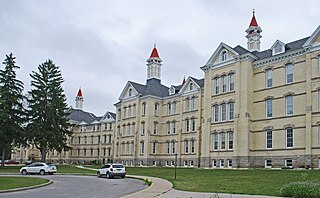Related Research Articles
A mental disorder, also referred to as a mental illness or psychiatric disorder, is a behavioral or mental pattern that causes significant distress or impairment of personal functioning. A mental disorder is also characterized by a clinically significant disturbance in an individual's cognition, emotional regulation, or behavior. It is usually associated with distress or impairment in important areas of functioning. There are many different types of mental disorders. Mental disorders may also be referred to as mental health conditions. Such features may be persistent, relapsing and remitting, or occur as single episodes. Many disorders have been described, with signs and symptoms that vary widely between specific disorders. Such disorders may be diagnosed by a mental health professional, usually a clinical psychologist or psychiatrist.

Psychiatric hospitals, also known as mental health hospitals or behavioral health hospitals, are hospitals or wards specializing in the treatment of severe mental disorders, such as schizophrenia, bipolar disorder, eating disorders, dissociative identity disorder, major depressive disorder and many others. Psychiatric hospitals vary widely in their size and grading. Some hospitals may specialize only in short-term or outpatient therapy for low-risk patients. Others may specialize in the temporary or permanent containment of patients who need routine assistance, treatment, or a specialized and controlled environment due to a psychiatric disorder. Patients often choose voluntary commitment, but those whom psychiatrists believe to pose significant danger to themselves or others may be subject to involuntary commitment and involuntary treatment. Psychiatric hospitals may also be called psychiatric wards/units when they are a subunit of a regular hospital.

Anti-psychiatry is a movement based on the view that psychiatric treatment is often more damaging than helpful to patients, highlighting controversies about psychiatry. Objections include the reliability of psychiatric diagnosis, the questionable effectiveness and harm associated with psychiatric medications, the failure of psychiatry to demonstrate any disease treatment mechanism for psychiatric medication effects, and legal concerns about equal human rights and civil freedom being nullified by the presence of diagnosis. Historically critiques of psychiatry came to light after focus on the extreme harms associated with electroconvulsive treatment or insulin shock therapy. The term "anti-psychiatry" is in dispute and often used to dismiss all critics of psychiatry, many of who agree that a specialized role of helper for people in emotional distress may at times be appropriate, and allow for individual choice around treatment decisions.
A patient is any recipient of health care services that are performed by healthcare professionals. The patient is most often ill or injured and in need of treatment by a physician, nurse, optometrist, dentist, veterinarian, or other health care provider.
MindFreedom International is an international coalition of over one hundred grassroots groups and thousands of individual members from fourteen nations. Based in the United States, it was founded in 1990 to advocate against forced medication, medical restraints, and involuntary electroconvulsive therapy. Its stated mission is to protect the rights of people who have been labeled with psychiatric disorders. Membership is open to anyone who supports human rights, including mental health professionals, advocates, activists, and family members. MindFreedom has been recognized by the United Nations Economic and Social Council as a human rights NGO with Consultative Roster Status.
Peer support occurs when people provide knowledge, experience, emotional, social or practical help to each other. It commonly refers to an initiative consisting of trained supporters, and can take a number of forms such as peer mentoring, reflective listening, or counseling. Peer support is also used to refer to initiatives where colleagues, members of self-help organizations and others meet, in person or online, as equals to give each other connection and support on a reciprocal basis.

Telepsychiatry or telemental health refers to the use of telecommunications technology to deliver psychiatric care remotely for people with mental health conditions. It is a branch of telemedicine.
The psychiatric survivors movement is a diverse association of individuals who either currently access mental health services, or who are survivors of interventions by psychiatry.
Psychiatric rehabilitation, also known as psych social rehabilitation, and sometimes simplified to psych rehab by providers, is the process of restoration of community functioning and well-being of an individual diagnosed in mental health or emotional disorder and who may be considered to have a psychiatric disability.
The recovery model, recovery approach or psychological recovery is an approach to mental disorder or substance dependence that emphasizes and supports a person's potential for recovery. Recovery is generally seen in this model as a personal journey rather than a set outcome, and one that may involve developing hope, a secure base and sense of self, supportive relationships, empowerment, social inclusion, coping skills, and meaning. Recovery sees symptoms as a continuum of the norm rather than an aberration and rejects sane-insane dichotomy.

Mad Pride is a mass movement of the users of mental health services, former users, and the aligned, which advocates that individuals with mental illness should be proud of their 'mad' identity. Mad Pride activists seek to reclaim terms such as "mad", "nutter", and "psycho" from misuse, such as in tabloid newspapers, and in order to switch it from a negative view into a positive view. Through mass media campaigns, Mad Pride activists seek to re-educate the general public on the causes of mental disabilities, the experiences of those using the mental health system, and the global suicide pandemic.
James Barry "Jim" Gottstein is a mostly retired Alaska based lawyer who practiced business law and public land law, and is well known as an attorney advocate for people diagnosed with serious mental illness. Gottstein has sought to check the growth in the administration of psychotropics, particularly to children.
The National Center for Trauma-Informed Care is a United States based medical charity, funded by the Center for Mental Health Services (CMHS). Created in 2005, it assists publicly funded agencies, programs, and services in making a cultural shift to a more trauma-informed environment — an environment intended to be more supportive, comprehensively integrated, and empowering for trauma survivors.
Self-help groups for mental health are voluntary associations of people who share a common desire to overcome mental illness or otherwise increase their level of cognitive or emotional wellbeing. Despite the different approaches, many of the psychosocial processes in the groups are the same. Self-help groups have had varying relationships with mental health professionals. Due to the nature of these groups, self-help groups can help defray the costs of mental health treatment and implementation into the existing mental health system could help provide treatment to a greater number of the mentally ill population.

Judi Chamberlin was an American activist, leader, organizer, public speaker and educator in the psychiatric survivors movement. Her political activism followed her involuntary confinement in a psychiatric facility in the 1960s. She was the author of On Our Own: Patient-Controlled Alternatives to the Mental Health System, which is a foundational text in the Mad Pride movement.
The National Empowerment Center (NEC) is an advocacy and peer-support organization in the United States that promotes an empowerment-based recovery model of mental disorders. It is run by consumers/survivors/ex-patients "in recovery" and is located in Lawrence, Massachusetts in Essex County.
Services for mental health disorders provide treatment, support, or advocacy to people who have psychiatric illnesses. These may include medical, behavioral, social, and legal services.
Mentalism or sanism refers to the systemic discrimination against or oppression of individuals perceived to have a mental disorder or cognitive impairment. This discrimination and oppression are based on numerous factors such as stereotypes about neurodiversity. Mentalism impacts individuals with autism, learning disorders, ADHD, FASD, bipolar, schizophrenia, personality disorders, stuttering, tics, intellectual disabilities, and other cognitive impairments.
The following outline is provided as an overview of and topical guide to the psychiatric survivors movement:

David William Oaks is a civil rights activist and co-founder and former executive director of Eugene, Oregon-based MindFreedom International.
References
- Bluebird, G., "History of the Consumer/Survivor Movement." https://www.power2u.org/downloads/HistoryOfTheConsumerMovement.pdf
- Chamberlin, J. (1979). On our own: Patient –controlled alternatives to the mental health system. New York; McGraw-Hill.
- McDonald, (2006), McDonald, C. (2006) Challenging Social Work: The Context of Practice, Basingstoke, Palgrave Macmillan.
- McLaughlin, H. (2009), "What's in a Name: ‘Client’, ‘Patient’, ‘Customer’, ‘Consumer’, ‘Expert by Experience’, ‘Service User’—What's Next?" Br. J. Soc. Work, (2009) 39, 1101–1117.
- Morrison, L. (2000). Committing social change for psychiatric patients: The consumer/survivor movement. Humanity & Society , 24, 389-404.
- A compilation of uncensored real life experiences with mental illness
- 'Our Consumer Place' website including a Consumers as Educators Program and Resource Book